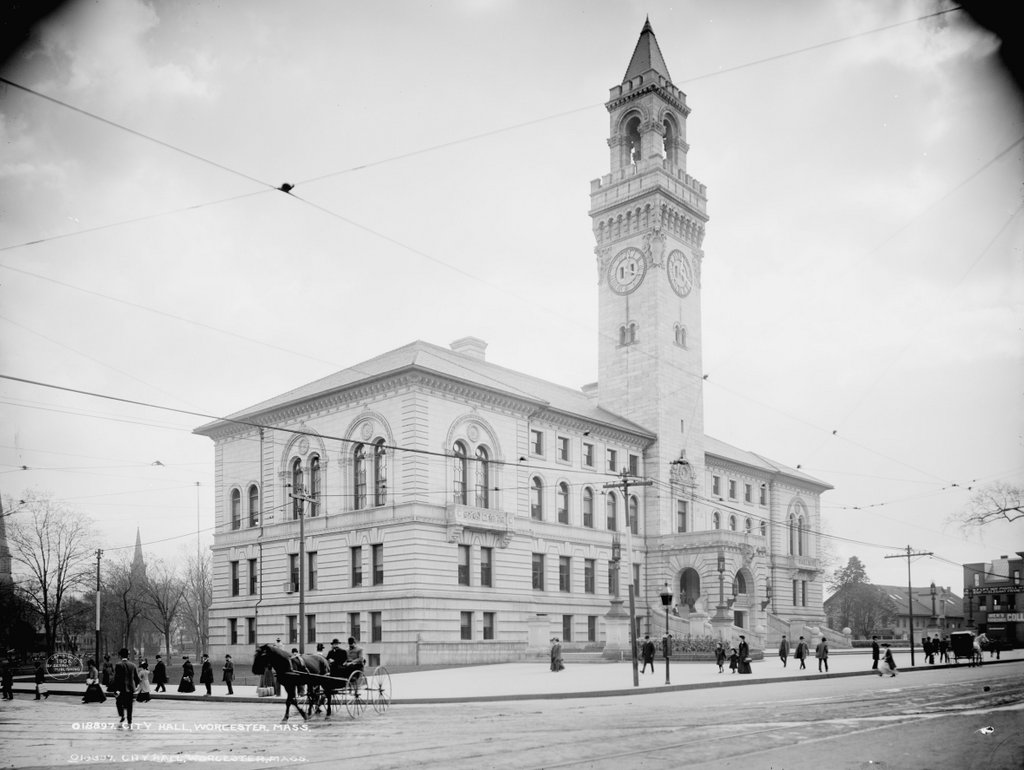2024 Chamber Public Policy Review

City Hall, Worcester, Mass (Photo Credit Lost New England)
WORCESTER – Whether at City Hall or Town Halls, the State House, or on Capitol Hill the Worcester Regional Chamber of Commerce showcased its advocacy for the business community in Worcester and Central Massachusetts this year. There were multiple initiatives that the Chamber was a part of from housing to workforce, education to reform, with the goal to propel Worcester forward and create new opportunities for our community’s growth.
The Chamber was a regular attendee at Worcester’s City Council meetings, and subcommittee meetings as well as the Zoning Board of Appeals and Planning Board. At City Hall, we offered testimony and advocated on behalf of orders, resolutions, and development projects that seek to support and affect the Worcester community.
On Tax Classification, the Chamber was able to make positive strides with Worcester’s commercial/industrial tax rates. Tthe business community was able to work collectively with the City Council to narrow the tax gap for only the second time in 10 years. The Chamber will continue to advocate on behalf of the business community by working with our Councilors to continue to narrow the gap and signal to small businesses, employers, and developers that Worcester is making positive strides to further encourage sustainable business development in the City.
Moreover, the Chamber was able to continue its advocacy in both Auburn and Clinton to push to close their tax gaps within their communities, by showcasing the positives of increased business development within both towns.
At the state level, the Chamber was instrumental in pushing forward both the Affordable Homes Act (Housing Bond Bill) and the Mass Leads Act (Economic Development Bond Bill), to assist our region with both housing and economic development. We worked with our local state delegation and have submitted testimony to multiple committees on these bills to assist with their passing and signature. A recent study by MassINC shows that Worcester, in order to support its continued population growth, needs over 8,000 new units of housing, which the Affordable Homes Act will be instrumental in supporting. Moreover, the Mass Leads Act will assist with the region’s continued effort to promote itself as a biomanufacturing hub, with the capital reauthorization of the Patrick-Murray Administration’s Life Sciences Initiative over another 10 years, allowing Worcester and Central Massachusetts to compete globally to attract employers and create job growth.
Further, this year the Chamber has been an advocate for the expansion of funding and resources for Chapter 74 programs, through its involvement with the Alliance for Vocational Technical Education. Vocational education is a key component to our Commonwealth’s education system, workforce development goals, and a strong and resilient economy, as programs equip students with the skills needed to enter the workforce, gain well-paying jobs, or go onto college in technical, engineering, and STEM fields.
During the election this year, the Chamber was an advocate for two ballot questions, No on Question 2 and No on Question 5. On Question 2 the Chamber advocated for keeping the MCAS as a graduation requirement, ensuring that MA students graduate with the educational skills that allow them to work and compete in an increasingly complex world economy. For Question 5 the Chamber advocated to defeat this ballot question to support our local small businesses, restaurants, and tipped employees. The current law, already requires employers in the hospitality industry to provide tipped employees with a guaranteed minimum wage of $15, makes up the difference for tipped employees who did not earn a minimum wage with tips.
The Chamber also presented a new economic development concept plan, called the West Side Artery Project. This concept plan seeks to address past planning mistakes and encourage pedestrian connections, add more community green spaces, and create housing density through infill development on excess surface parking lots in this area. Located one block west of Main Street, in Downtown Worcester, the area encompasses lots and land on Chestnut, Harvard, Irving, Lancaster, and Linden Streets from Chandler Street to Salisbury Street. There is tremendous opportunity with this plan to create a budding neighborhood environment, with housing, retail shops, and restaurants, all within walking distance of Downtown.
Lastly, for events and speakers, the Chamber was able to host many key figures within the Massachusetts State Government and public policy sector. They included; Governor Maura Healey, Lt. Governor Kimberly Driscoll, Secretary Ed Augustus, Secretary Yvonne Hao, Secretary Lauren Jones, Undersecretary Alicia Ordway, Assistant Secretary Ken Brown, West-East Rail Coordinator Andy Koziol, the President of the Massachusetts Taxpayers Foundation, Doug Howgate, President & CEO of MassBio, Kendalle Burlin O’Connell, and Executive Vice President of The Massachusetts Business Roundtable, Tonja Mettlach to name a few.
Next year the Worcester Regional Chamber of Commerce will celebrate its 150th anniversary and we will look forward to and continue to advocate on behalf of the Central Massachusetts business community for what the year will bring with a new legislative session at both the federal and state levels, as well as election season for our local officials
Michael Kane is the Worcester Regional Chamber of Commerce’s Economic Development & Public Policy Associate

